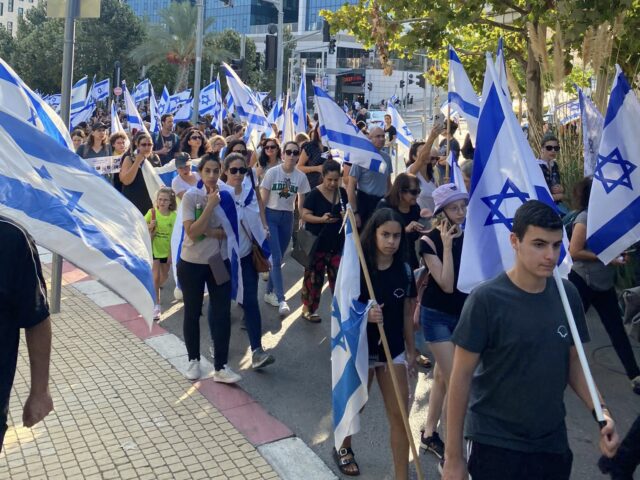Israelis are weighing the pros and cons of a hostage deal with Hamas that the government approved late Tuesday night, and which will go into effect at 10:00 a.m. local time (3:00 a.m. EST) on Thursday morning.
Under the deal, Hamas will release fifty female, child, and/or elderly hostages over the course of four days, during which time Israel will halt its military offensive in Gaza. Israel will also release 150 female and/or teenage Palestinian prisoners, and deliver additional food and fuel to the Gaza Strip.
The deal has an extension option: Hamas can buy itself an additional day of quiet by releasing ten more hostages each day, up to a maximum total of ten days (including the first four). Israel is prepared to release up to 300 Palestinian prisoners in total.
Almost every political party in Israel, government and opposition, voted to approve the deal, which is a sign of how important the hostages are to Israelis. Prime Minister Benjamin Netanyahu has placed it on an equal level to destroying Hamas as a war goal.
One notable exception: the Otzma Yehudit party, a far-right party whose leader, Itamar Ben Gvir, is national security minister.
The question is whether Israel can, in fact, pursue both goals at once. Negotiating with Hamas at all — even through mediators like the government of Qatar — risks lending legitimacy to the group. A pause in fighting will also allow Hamas to regroup, and will give Israel’s international critics time to increase their pressure on the Israeli government to stop the war in Gaza entirely.
There is also the problem of giving terrorists additional incentives to kidnap hostages in the future, and the risk that some of the hostages might return to the fight as terrorists — as Hamas’s Gaza leader, Yahya Sinwar, did when released in a 2011 hostage deal.
But there are advantages in the deal for Israel. One is that it maintains social cohesion. The Israeli government is already weak politically; had it refused a potential hostage deal, it might have faced growing domestic opposition and a protest movement that could have renewed the political divisions that, so far, have retreated since October 7. The deal keeps everyone united in the war.
A second, less obvious advantage is that it increases the motivation of Israeli soldiers. The Israel Defense Forces (IDF) relies heavily on reservists; it is a citizen army. Ordinary Israeli men and women are happier to risk their lives in war if they know that the country will also take risks to save them, if things go wrong. Lopsided hostage deals may seem strange from an external point of view, but to Israelis they affirm that society is prepared to make sure no one is left behind, so people feel less afraid to fight.
A third advantage is that Israeli soldiers, too, need a break. Many left their homes suddenly on October 7 or 8 and have not been back since. While Hamas spends the “pause” in tunnels, many Israeli soldiers will be able to go home, enjoy the Sabbath, play with their kids, eat home-cooked meals, make love, and do whatever else it is they want to do before returning, refreshed, for the fight.
The risk of a temporary lull in fighting becoming permanent is low, for a variety of reasons. First, the deal does not cover Iran-backed Hezbollah in Lebanon or the Iran-backed Houthis in Yemen, both of which are still firing missiles at Israel. So the war will continue.
Second, Israelis believe that the hostage deal was only possible because of the ground war in Gaza. Israel’s defense minister, Yoav Gallant — probably the most trusted public official in Israel at the moment — has told Israelis that they must keep fighting if they want to see more hostages released after the deal expires.
Finally, Israelis themselves want to continue fighting, because they no longer believe they can be safe if Hamas still exists next door in Gaza. They are in this for the very long haul.
Joel B. Pollak is Senior Editor-at-Large at Breitbart News and the host of Breitbart News Sunday on Sirius XM Patriot on Sunday evenings from 7 p.m. to 10 p.m. ET (4 p.m. to 7 p.m. PT). He is the author of the new biography, Rhoda: ‘Comrade Kadalie, You Are Out of Order’. He is also the author of the recent e-book, Neither Free nor Fair: The 2020 U.S. Presidential Election. He is a winner of the 2018 Robert Novak Journalism Alumni Fellowship. Follow him on Twitter at @joelpollak.

COMMENTS
Please let us know if you're having issues with commenting.